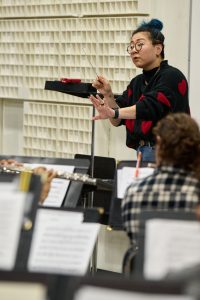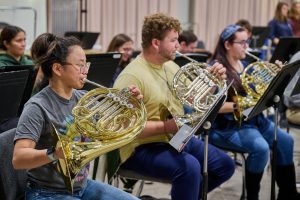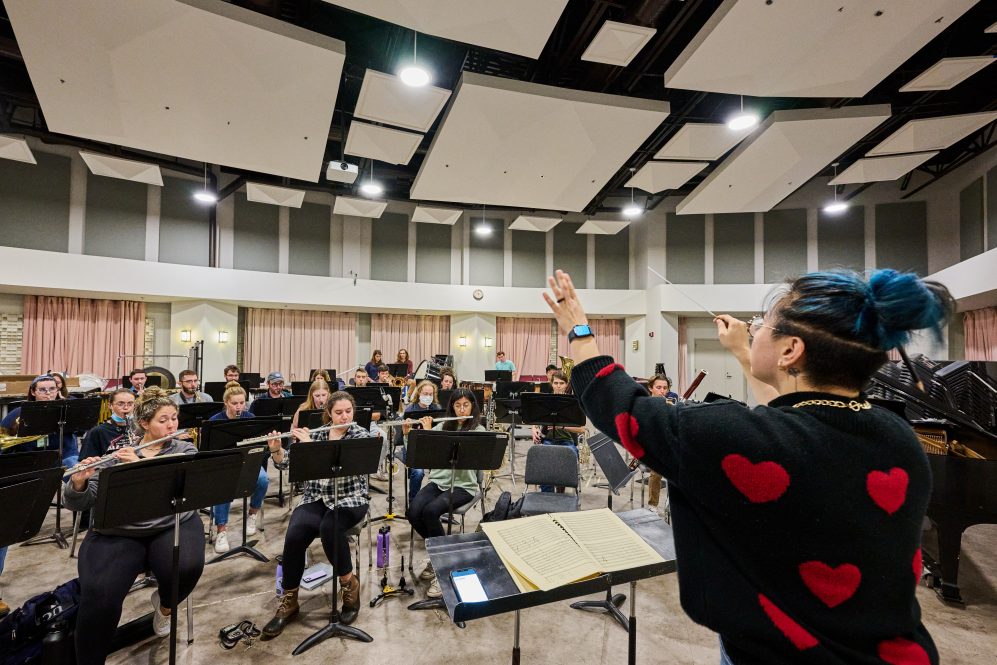Janet Song Kim describes their new position as director of the UConn Wind Ensemble as a dream job, one that gives room for personal creativity and student instruction, along with the possibility for community outreach.
The new start might explain the impetus for the four-part concert series, “American Dream,” which begins Oct. 13, but anyone who knows Kim understands there’s subtext in almost everything they do.
“The way I program concerts is based on what’s happening in the world, and I want to create a show that’s relevant,” Kim, who’s also an assistant professor in the music department, says.
Take for instance, last year’s holiday performance at Nebraska Wesleyan University, where they headed the instrumental program before coming to UConn. In “Messages From Mother Earth,” Kim paired the school’s symphonic band with a multimedia presentation that included TikTok videos, actors from the theater department, and the state climatologist to talk about global warming.
It was a reaction, Kim says, to student remarks about how there used to be more snow in the winter than today and their noticing a decreased emphasis on simple practices like recycling in the center of the country.
While “American Dream” might give the face impression of being a celebration of Uncle Sam, its four chapters look critically at the tug of war in society today: American exceptionalism, gun and abortion rights, and the tumultuous history of Black Americans and immigrants.
“It’s not for me to dictate what people take away from the series,” Kim says. “This is merely something I created and I’m putting on display. You can have a reaction, or you cannot. You can walk away having deeper thoughts about one side or the other, or not. In either case I’m happy to have shared a piece of myself and a piece of the students’ work.”
Kim knew the capabilities of the Wind Ensemble the moment they stepped off the podium during the practical part of their job interview, they say, and keyed into what the student musicians needed to work on and what they could be pushed to do.
First came acceptance of the job offer. Next came a search for project funding, and then a grant application to OVPR’s JEDI Research Initiative, which funds projects focused on Justice, Equity, Diversity, and Inclusion. Finally, came shaping a concert series to fit the grant parameters.

“There’s nothing in this world aside from the arts and music that brings people together to understand how others are feeling,” Kim says. “I suppose if people could walk away with anything from these concerts it might be the thought that when you consider other people, beautiful things can happen.”
The first concert, “Americana,” features the Wind Ensemble and UConn Symphonic Band performing music including Morton Gould’s “Fanfare for Freedom” to depict a beautiful, idyllic country and William Grant Still’s “Summerland” to shift from celebration to recognizing the country’s dark history with slavery. Augusta Read Thomas’ “Magneticfireflies” demonstrates today’s societal divides and William Schuman’s arrangement of Charles Ives’ “Variations on ‘America’” reinforces citizens’ varied beliefs, intentions, goals, and starting points.
“For someone who isn’t thinking too deeply about this, it’s just an American concert,” Kim says. “But if we delve deep into what’s happening structurally in the music, we can see a lot more of what’s happening in America.”
The second concert, “Our Right to Bear” on Nov. 17, uses Kenneth J. Alford’s “Voice of Guns,” Catherine Bostic’s “Portrait of a Peaceful Warrior,” Andrew Boss’ “Until Morning Comes,” and David Maslanka’s “Give Us This Day” to look at the emotions that go into the arguments around gun control and regulating the bearing of children.
“A lot of people talk about these two issues separately, but they’re very related especially in how many times these gun issues happen in school settings with young children. Look at how much money goes into advocating for or against gun rights and compare that to the supply chain shortages and how there isn’t enough baby formula in the U.S. They’re intertwined whether people want to admit it or not,” Kim says.
The final two shows – “Black History” on Feb. 23 and “Move Along” on April 13 – consider the histories of Black Americans and immigrants, with pieces including Henry Dorn’s “Shadows,” Valerie Coleman’s “Roma,” and Nebal Maysaud’s “On the Mountains of Orphalese.” The “Black History” concert also will feature UConn’s Ricardo Brown, associate director of bands and associate professor in residence, and UConn’s Voices of Freedom in a special performance.

Each of the concerts is part of Kim’s artistic vision, but the final is most personal, they say: “My whole life has been based on following the American dream. It’s what my family left Korea and came here for. ‘Move Along’ is the most personal perspective I can provide because I come from an immigrant family.”
But their just being on the stage is also a personal statement.
The JEDI grant – which they’ll learn if they received on Nov. 1, after starting the series – would pay for expenses related to community outreach. Kim hopes to combine highlights from each concert into a single show that can bring the ensemble into public schools with primarily non-white populations.
They hope to bulk up the music library shared by the Wind Ensemble and Symphonic Band to include composers of color and of different genders. They also hope to hire professional musicians not just to round out instrumentation holes in the ensemble, but to give public school children a look at what they could achieve.
Kim points to an American League of Orchestras 2021 guide on inclusion that notes only 1.8% of orchestra members are Black as reason enough to make this a priority.
“If we have hired ringers who are people of color, if we have our diverse body of students on display in front of students in Hartford, which has a high Vietnamese population, a high Black population, and a high Latinx population, they can see what’s possible,” Kim says. “And then, for them to see me, a person who is a nonbinary, gender-fluid, female-presenting Asian in a position of power, as opposed to the traditional white, male band director, is also going to be revealing to them.”
For Kim, there’s always subtext.
“The real American dream to me, if I can define it, is all the different people and all the different experiences coming together, in one place,” they say. “I don’t think that happens in any other country but ours.”
The “American Dream” concert series will be performed at 8 p.m. at the von der Mehden Recital Hall. “Americana” will be held Oct. 13; “Our Right to Bear,” Nov. 17; “Black History,” Feb. 23; and “Move Along,” April 13. Tickets are available on von der Mehden’s Ticketleap website.



